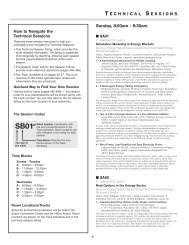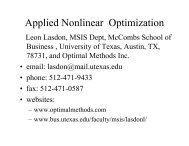Sunday
Sunday
Sunday
You also want an ePaper? Increase the reach of your titles
YUMPU automatically turns print PDFs into web optimized ePapers that Google loves.
SA55<br />
2 - Robust Queueing Theory<br />
Chaithanya Bandi, PhD Student, Massachusetts Institute of<br />
Technology, Cambridge, MA, 02139, United States of America,<br />
cbandi@mit.edu, Dimitris Bertsimas, Nataly Youssef<br />
We propose an alternative approach for studying queueing systems by employing<br />
robust optimization as opposed to stochastic analysis. While traditional queueing<br />
theory relies on Kolmogorov’s axioms of probability and models arrivals and<br />
services as renewal processes, we use the limit laws of probability as the axioms of<br />
our methodology and model the queueing systems primitives by uncertainty sets.<br />
In this framework, we obtain closed form expressions for the waiting times in<br />
multi-server queues with heavy-tailed arrival and service processes. These<br />
expressions are not available under traditional queueing theory for heavy-tailed<br />
processes, while they lead to the same qualitative insights for independent and<br />
identically distributed arrival and service times. We also develop an exact calculus<br />
for analyzing a network of queues with multiple servers based on the following<br />
key principle: a) the departure from a queue, b) the superposition, and c) the<br />
thinning of arrival processes have the same uncertainty set representation as the<br />
original arrival processes. We show that our approach, which we call the Robust<br />
Queueing Network Analyzer (RQNA) a) yields results with error percentages in<br />
single digits (for all experiments we performed) relative to simulation, b)<br />
performs significantly better than the Queueing Network Analyzer (QNA)<br />
proposed in Whitt [1983], and c) is to a large extent insensitive to the number of<br />
servers per queue, the network size, degree of feedback, traffic intensity, and<br />
somewhat sensitive to the degree of diversity of external arrival distributions in<br />
the network.<br />
3 - New Functional Characterizations and Optimal Structural<br />
Results for Assemble-to-order M-Systems<br />
Emre Nadar, Carnegie Mellon University, Tepper School of<br />
Business, Pittsburgh, PA, United States of America,<br />
enadar@andrew.cmu.edu, Alan Scheller-Wolf, Mustafa Akan<br />
We consider an assemble-to-order M-system with multiple components, multiple<br />
products, batch ordering of components, random lead times, and lost sales. We<br />
model the system as an infinite-horizon Markov decision process and seek an<br />
optimal control policy: a control policy specifies when a batch of components<br />
should be produced, and whether an arriving demand for each product should be<br />
satisfied.We introduce new functional characterizations for submodularity and<br />
supermodularity restricted to certain subspaces. These enable us to characterize<br />
optimal inventory replenishment and allocation policies under a mild condition<br />
on component batch sizes via a new type of policy: lattice-dependent base-stock<br />
production and lattice-dependent rationing.<br />
■ SA55<br />
55- Regency Ballroom B - Hyatt<br />
Supply Chain and Operations Issues in<br />
Emerging Economies<br />
Cluster: Operations Research in Emerging Economies<br />
Invited Session<br />
Chair: Mili Mehrotra, University of Minnesota, 321 19th Ave. South,<br />
Minneapolis, MN, United States of America, milim@umn.edu<br />
Co-Chair: Tharanga Rajapakshe, Assistant Professor, University of<br />
Florida, Warrington School of Business Administra, Gainesville, FL,<br />
32606, United States of America,<br />
Tharanga.rajapakshe@warrington.ufl.edu<br />
1 - Improving Agricultural Productivity: Impact of Minimum<br />
Support Prices<br />
Tharanga Rajapakshe, Assistant Professor, University of Florida,<br />
Warrington School of Business Administra, Gainesville, FL, 32606,<br />
United States of America,<br />
Tharanga.rajapakshe@warrington.ufl.edu<br />
A Minimum Support Price (MSP) for an agricultural crop is a guaranteed price,<br />
regardless of volume, at which a governmental entity agrees to purchase the crop<br />
from farmers. This work is an effort to understand the influence of MSP on a<br />
homogenous farming community cultivating a single crop. We analyze the impact<br />
of production cost and yield uncertainty on the MSP. Our results explain the role<br />
of MSP in improving productivity and social utility.<br />
2 - Improving the Milk Supply Chain in Developing Countries:<br />
Analysis under Competing Intermediaries<br />
Liying Mu, University of Texas at Dallas, 800 W. Campbell Road,<br />
Richardson, TX, 75080, United States of America,<br />
muliying@utdallas.edu, Milind Dawande, Vijay Mookerjee<br />
Quality issues in milk – arising primarily from deliberate adulteration by<br />
producers — have been reported in many developing countries. High testing cost<br />
and competition between milk stations (which act as intermediaries by buying<br />
milk from producers and selling it to firms) are identified as the main causes for<br />
the low quality of milk. We propose a mechanism to incentivize high-quality milk<br />
with minimum testing, in the presence of competing milk stations.<br />
INFORMS Phoenix – 2012<br />
74<br />
3 - A Stochastic Optimization Based Decision Support System for<br />
Planning in a Process Industry<br />
Goutam Dutta, Professor, Indian Institute of Management,<br />
Production Quantitive Methods Area, Ahmedabad, Gujarat, Gu,<br />
380015, India, goutam@iimahd.ernet.in, Narain Gupta,<br />
Robert Fourer<br />
We introduce a multi-period, multiple scenario optimization based decision<br />
support system. The DSS is based on a two stage stochastic linear program with<br />
recourse for strategic planning in process industry. The model maximizes expected<br />
contribution subject to material balance, facility capacity, and constraints for nonanticipativity.<br />
We describe how the database structure for the stochastic<br />
optimization model is different in comparison to the multi-period deterministic<br />
model.<br />
4 - Agricultural Cooperatives for Alleviating Poverty:<br />
Models and Analyses<br />
Jaehyung An, PhD Student, UCLA Anderson School of<br />
Management, 11140 Rose Ave. #405, 90034, Los Angeles, CA,<br />
90034, United States of America,<br />
jaehyung.an.2013@anderson.ucla.edu, Soo-Haeng Cho,<br />
Christopher Tang<br />
In emerging markets such as Brazil, China and India, the agricultural sector plays<br />
an important role in their economic growth even though many farmers in these<br />
markets are trapped in the poverty cycle. To break this vicious cycle, government<br />
agencies, Non-Governmental Organizations, and social enterprises are helping<br />
farmers to establish agricultural cooperatives (coops). In this paper, we analyze<br />
the impact of these coops on the production quantities, as well as their impact on<br />
the market.<br />
■ SA56<br />
56- Curtis A- Hyatt<br />
Strategy and Strategic Planning<br />
Contributed Session<br />
Chair: Jay Lee, California State University Sacramento, 6000 J St.,<br />
Tahoe Hall 2079, Sacramento, CA, 95819, United States of America,<br />
jlee@csus.edu<br />
1 - Applying Synthetic Control Methodology in Management<br />
Research: Analyzing the Impact of Government Assistance on<br />
Chrysler’s Performance<br />
Brian Richter, Assistant Professor of Business, Economics, and<br />
Public Policy, Richard Ivey School of Business, University of<br />
Western Ontario, 1151 Richmond Street North, London, ON,<br />
N6A3T9, Canada, brian.richter.@mccombs.utexas.edu, Adam<br />
Fremeth, Guy Holburn<br />
We introduce synthetic control to management research by demonstrating how to<br />
apply the technique to quantify the effects of managerial interventions when a<br />
single observation unit receives a treatment on a single date. The problem with<br />
such scenarios is that counterfactual data is typically lacking. The method,<br />
however, allows us to generate counterfactual data systematically from among<br />
untreated firms. In our application, we assess the impact of government assistance<br />
on Chrysler’s performance.<br />
2 - New Methodology for the Mandatory Minimal Outflow<br />
Representation on Hydrothermal Ssystems Planning<br />
Wellington Conceicão, Instituto Federal de Educacão e Tecnologia,<br />
Campus IFET, Juiz de Fora, Brazil, wellingtcc@yahoo.com.br,<br />
André Marcato, Joao Passos Filho, Rafael Brandi, Tales Ramos,<br />
Ivo Silva Junior<br />
This work presents an alternative methodology to supply the mandatory<br />
minimum outflow in the problem of long-term operation planning of<br />
hydrothermal interconnected systems. It was used the strategy of trying to<br />
maintain the storage reservoirs within safe levels through a minimum curve of<br />
stored energy level. The simulation results shows that when using this<br />
formulation a decrease in the minimum outflow deficit is obtained.<br />
3 - Game Theoretic Analysis of Inter-firm R&D Expenditure<br />
Distribution in Semiconductor Manufacturing<br />
Tom Heaps-Nelson, PhD Candidate, Massachusetts Institute of<br />
Technology, 77 Massachusetts Ave., Cambridge, MA, 02139-4301,<br />
United States of America, heaps@mit.edu<br />
Soaring R&D and capital investment costs has left the semiconductor industry<br />
with a handful of large chipmakers and semiconductor equipment suppliers. This<br />
paper employs non-cooperative game theory along with detailed empirical<br />
estimates of firm payoffs as a framework for understanding how the largest<br />
industry players are likely to share the burden of R&D funding for two ongoing<br />
industry-wide process technology transitions: EUV lithography and 450mm<br />
wafers.



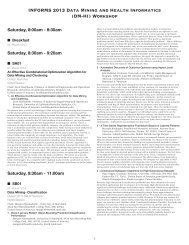
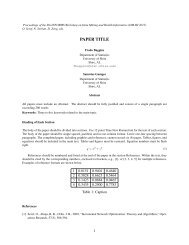
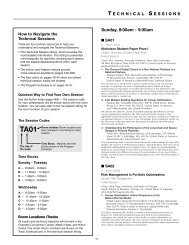
![[PDF] Charlotte Back Matter](https://img.yumpu.com/17933057/1/190x245/pdf-charlotte-back-matter.jpg?quality=85)
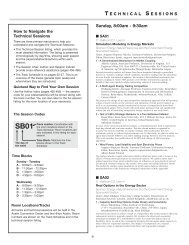
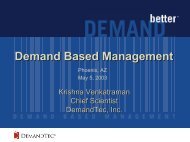
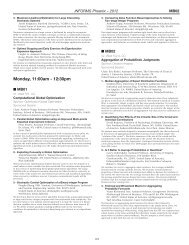
![[PDF] ALIO Back Matter](https://img.yumpu.com/17932960/1/190x245/pdf-alio-back-matter.jpg?quality=85)

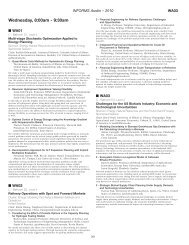
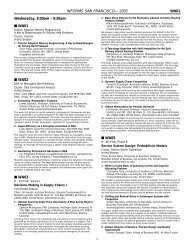
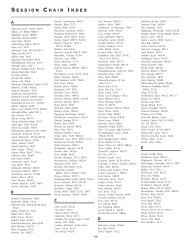
![[PDF] Monday, 8:00am - 9:30am](https://img.yumpu.com/17932954/1/190x245/pdf-monday-800am-930am.jpg?quality=85)
